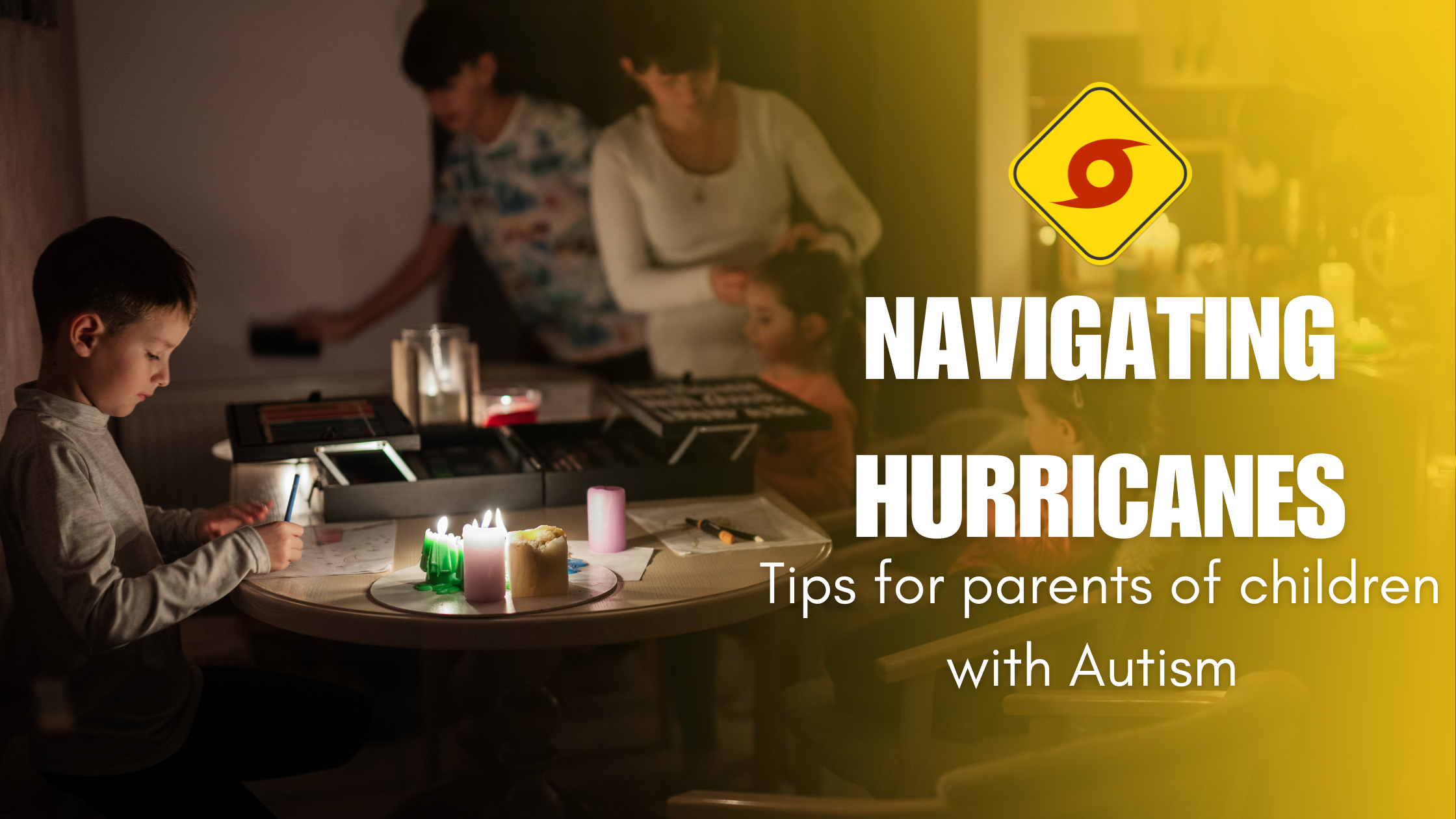NAVIGATING HURRICANES: Tips for parent of children with Autism
October 8, 2024

With hurricane Milton on it’s way it serves as a reminder that we live in Florida where hurricanes are an inevitable part of life. But when you’re a parent of a child with Autism, preparing for these natural disasters can come with unique challenges. Children with autism often thrive on routines and can be sensitive to changes in their environment. The unpredictability and stress of a hurricane can lead to heightened anxiety, behavioral challenges, and sensory overload.
This blog post we’ll dive into practical tips and strategies to help parents of children with autism manage hurricane preparations and evacuations. By planning ahead and keeping your child’s specific needs in mind, you can make this stressful time easier for the whole family.
1. Create a Visual Schedule
Children with autism often respond well to visual schedules, which can help them understand what to expect during a hurricane. Create a simple visual guide showing the steps you’ll be taking, such as:
- Packing bags
- Securing the house
- Driving to a safe location or shelter
Use pictures, symbols, or short phrases to explain each step. This visual aid can provide a sense of structure during the uncertainty of hurricane preparations and can ease anxiety about what’s happening next.
Example:
- Show images of packing a bag with their favorite items, such as toys or sensory tools.
- Include a step of listening to weather reports or alerts, if that’s part of your routine.
2. Prepare a Sensory-Friendly Go Bag
If you need to evacuate or go to a shelter, a “go bag” specifically tailored to your child’s sensory needs can be a lifesaver. This bag should include comfort items and tools that will help them manage stress and sensory overload during the storm.
Suggestions for your sensory-friendly go bag:
- Noise-cancelling headphones: To block out loud sounds like wind, rain, or alarms.
- Fidget toys or sensory items: To keep their hands occupied and reduce anxiety.
- Weighted blanket or compression vest: For calming pressure if your child uses these items.
- Favorite snacks and drinks: Familiar foods can provide comfort during a stressful situation.
- Tablet with their favorite shows or games: Preload a device with familiar apps, music, or videos to help soothe your child if Wi-Fi or TV access is limited.
3. Practice an Evacuation Plan
One of the most important parts of preparing for a hurricane is having a clear evacuation plan. For children with autism, practicing this plan in advance can help them feel more prepared when the time comes to put it into action.
Tips for practicing your evacuation plan:
- Take short practice trips: Drive the evacuation route to a safe location or shelter. This helps familiarize your child with the experience.
- Practice packing: Show your child how you’ll pack the car and have them help. This can reduce the surprise element when it’s time to leave for real.
- Use social stories: Social stories are a great way to introduce the concept of evacuation in a step-by-step format. You can create a custom story that explains how you’ll leave, where you’ll go, and how long you may need to stay.
4. Plan for Communication Needs
In times of stress, your child may have more difficulty communicating their needs. Make sure you have tools in place to help them communicate, whether they use verbal speech, a communication device, or other methods.
Ideas to prepare for communication challenges:
- Portable communication device or AAC (Augmentative and Alternative Communication) tools: Ensure these devices are fully charged and easily accessible.
- Picture exchange cards: If your child uses picture-based communication, have a set of relevant cards (like food, bathroom, quiet, help) ready to go.
- Practice key phrases or signs: Rehearse simple, important phrases they may need to use during an evacuation, like “I need help,” “I’m scared,” or “I need a break.”
5. Stick to Routines as Much as Possible
While a hurricane will certainly disrupt your daily schedule, try to maintain as much routine as possible, especially around meals, bedtime, and familiar activities. Children with autism often rely on routines for comfort, so recreating key parts of their daily structure can make a big difference.
Ideas for maintaining routines:
- Meal routines: Stick to familiar foods and eating schedules even if you’re in a shelter or staying with family.
- Bedtime routines: Bring familiar bedding or a favorite pillow to create a comforting environment at night.
- Daily activities: If your child has favorite activities (like drawing or watching a specific show), try to incorporate these into your day, even during an evacuation.
6. Notify Shelters of Your Child’s Needs
If you’re evacuating to a shelter, contact the facility ahead of time to explain your child’s specific needs. Many shelters will accommodate families with children with special needs, and it’s helpful to give them a heads-up to ensure the smoothest experience.
What to ask a shelter in advance:
- Quiet spaces: Is there a quieter area where your child can go if they become overwhelmed?
- Medical accommodations: Does the shelter have space for specialized equipment or therapies if your child requires them?
- Special needs shelters: In some areas, there are shelters specifically designed for individuals with special needs, which can offer a more accommodating environment.
7. Manage Your Own Stress
Your child will pick up on your stress levels, so it’s important to manage your own anxiety during hurricane season. Easier said than done, right? But taking a few moments for yourself can make a huge difference in how the rest of the family responds.
Quick tips for reducing your stress:
- Take deep breaths and use mindfulness techniques (even if it’s just for 5 minutes).
- Accept help from others—whether it’s from friends, family, or neighbors.
- Have a plan in place, so you feel more prepared when the storm comes.
8. Stay Informed, Stay Calm
Staying informed is important, but try to limit the amount of hurricane news your child is exposed to. Constant updates can heighten their anxiety. Instead, you can keep them in the loop by sharing simplified, child-friendly explanations of what’s happening without overwhelming them.
At ABA Solutions, we understand that preparing for a hurricane can be especially difficult when you’re also managing the needs of a child with autism. With proper planning and some helpful tools, you can reduce anxiety and make the process smoother for your entire family. Remember, it’s okay to reach out for help, whether it’s from local services or your ABA therapy provider.
We’re here to support you, both in times of calm and during hurricane season. If you have any questions or need help preparing for your child’s needs during a hurricane, don’t hesitate to reach out to us at ABA Solutions. Together, we can weather any storm!
